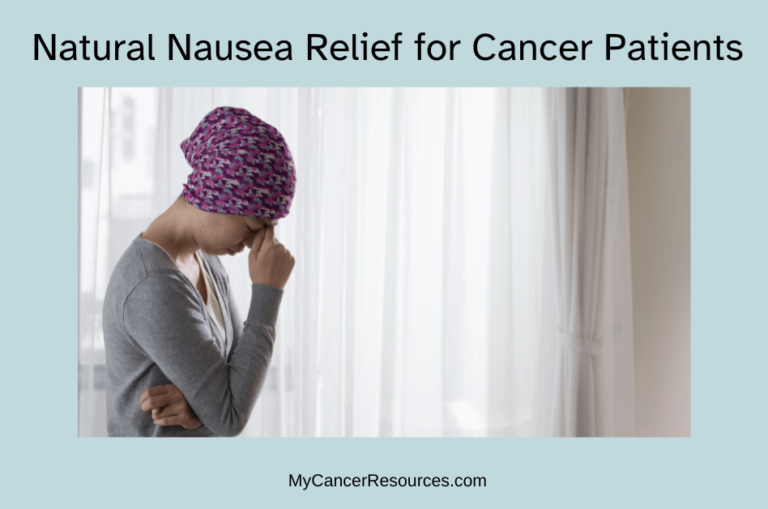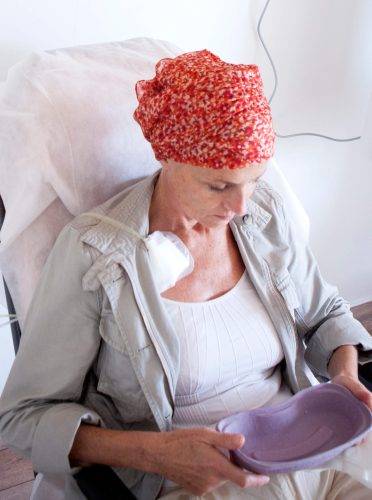My Cancer Resources is reader-supported. When you buy through links on the site, I may earn a small affiliate commission, at no cost to you. As an Amazon Associate, I earn from qualifying purchases. Thank your for supporting this small business.

Nausea is one of the most common and challenging side effects for those undergoing cancer treatment. You may already be on prescribed anti-nausea medicine, or you may be looking for more natural remedies. This article is all about natural nausea relief for cancer patients.
Nausea, which can range from mild nausea all the way to severe, can make you not want to eat. If you’re also vomiting and can’t keep food or drinks down, this can lead to dehydration, electrolyte imbalance, and malnutrition.
From food suggestions to herbs and supplements and complementary therapies proven to be an effective treatment for nausea, you’re sure to find something that can help!
Understanding Chemotherapy Induced Nausea
Chemo-induced nausea is the queasy sensation that makes you feel like you’re going to get sick. Chemotherapy drugs or radiation can interact with receptors in the brain and gastrointestinal tract, triggering the vomit reflex.
The sensation can vary from slight queasiness to severe nausea and/or bouts of vomiting that greatly impact one’s quality of life. This is why natural nausea relief for cancer patients is such an important topic.
Other reasons for nausea during cancer treatment include anxiety, anticipatory nausea and postoperative nausea.
- Anxiety is very common in people with cancer. Anxiety can be about worrying if the treatment will be successful, the impact that cancer is having on other areas of your life, etc.
- Pre-chemo anxiety is also common, especially if you were really sick or experienced other difficult side effects after an earlier treatment. This anxiety can make you feel nauseous right before your next treatment as you hope that you don’t feel as bad after this round of treatment. This is called anticipatory nausea.
- Post-operative nausea is caused by the anesthesia—medicines used to put you to sleep for surgery. When you wake up, a common side effect of those medicines is nausea.
Diet Recommendations For Nausea
You might find that switching up your eating habits just a little bit can make a huge difference in managing nausea.
Start by eating small meals, and eat more frequently, rather than three bigger meals in a day. Try to eat every 2 to 3 hours.
Even if you don’t feel up to eating a complete meal, take a few bites. This way you’ll always have a little bit of food in your stomach.
This approach is easier on your stomach and can help prevent the build-up of acid that triggers nausea. Sometimes nausea can kick in if you’ve gone too long on an empty stomach.
Experiment with the timing of your meals. Some find that eating a small amount shortly before treatment can help keep sickness away.
A bland diet can also be easy on the stomach. Do you remember growing up being told that the BRAT diet is good after you’ve been sick?
This acronym helps you remember some bland foods to try:
B: Bananas
R: Rice
A: Applesauce
T: Toast (dry toast rather than toast with toppings is recommended).
Some other bland foods include crackers and potatoes.
Room temperature or cold foods can also be helpful because they often release less aroma than hot foods do. Strong smells can sometimes trigger nausea, so staying in well-ventilated areas or eating outdoors in the fresh air if the weather allows.
Some have even reported needing to avoid grocery stores so they’re not overwhelmed by all the smells. See if someone else can handle your grocery shopping and give you that bit of time back to rest.
Though it might seem strange, many find that eating sour foods like lemons, limes, pickles or sour candy help ease nausea. Avoid these types of food if you have mouth sores.
Ginger has long been praised for its anti-nausea properties. Incorporate ginger into your diet through teas, ginger ale, ginger candies, or adding fresh ginger root to your meals.
Peppermint is another option to try. Drink peppermint tea or suck on peppermint candy.
One important tip I always recommend to my clients is to avoid your favorite foods when you have an upset stomach. If you eat a favorite food and then feel sick or even vomit, your body may associate that smell and taste with getting sick.
This feeling can last long after treatment ends, and you may struggle to eat something you previously loved.
Hydration and How to Sip Smart
I shared in another article about the importance of staying hydrated during cancer treatment. Being hydrated can also help manage nausea.
This is important, because two side effects of not drinking enough, dehydration and constipation, can also lead to more nausea.
Opt for clear liquids such as water, broth, and herbal teas, which are easier on the stomach. Fresh squeezed lemon juice in your water can double by giving you that sour taste in your mouth to fight nausea while also making sure you’re drinking enough fluids.
If your nausea has led to vomiting, sip on a sports drink to replace electrolytes.
Sip liquids slowly throughout the day rather than quickly drinking large amounts. Use a straw or a small cup to naturally limit intake with each sip.
Begin with ice chips or tiny sips of water if nausea makes it hard to drink. Gradually increase the amount as you can tolerate more.
Keep fluids at room temperature or slightly chilled, as extreme temperatures can sometimes trigger nausea.
The Power of Herbs, Vitamins and Supplements
Herbal remedies offer comforting relief from nausea for many cancer patients. Ginger and peppermint have already been mentioned. Other herbs including chamomile and lemon balm can also help.
Brew an herbal tea by steeping either slices of ginger root or the leaves of the herbs in boiling water. Let it soak until the flavor is strong enough for you. Sip it slowly throughout the day to keep symptoms at bay.
Vitamin B, particularly vitamin B6 is often recommended to pregnant women experiencing morning sickness. This has also been shown to help with chemotherapy-induced nausea.
Other supplements that may be worth checking out include zinc, astragalus, glutamine and ginseng.
Check with your care team to make sure the herbs, vitamins or supplements you’re thinking about using won’t interfere with your treatment plan. For instance, St. John’s Wort is often used for symptoms of depression. But it can make some chemotherapy treatments less effective.
Medicinal marijuana, or medical cannabis is often used to successfully fight nausea as well. If this is legal where you live, you may want to consider using it to reduce the severity of nausea or relieve it completely.
Complementary Therapies
Complementary Therapies can also be very effective. Here are some you may want to explore:
- Acupuncture: this form of Chinese traditional medicine uses tiny, thin needles on certain parts of your body to relieve a number of ailments, including nausea.
- Acupressure: this too, stimulates specific points on the body which triggers a relaxation response. For nausea, you can use your own fingers to apply pressure.
Find the place where the palm of your hand meets your wrist. Take your first two fingers and lay them across your wrist.
Just below where your fingers stop on your arm is a pressure point. Place firm pressure on that point for a minute or so, rest for a bit and press again until symptoms subside.
You can also purchase these soft wristbands. They have a small, hard sphere that when worn, triggers the acupressure point to stop nausea. - Massage therapy: massage relieves stress and promotes relaxation, which can indirectly help reduce nausea. A study showed that massage around the eyes along with music therapy led to a significant reduction in nausea and vomiting in patients with cancer.
- Aromatherapy: certain scents can also relax you and fight nausea, especially ginger essential oil, or lemon essential oil. Peppermint aromatherapy tends to be the favorite of most clients of mine.
You can use essential oils in a diffuser, or place a few drops on a cotton ball and inhale the scent whenever you start to feel sick. - Hypnosis – hypnosis can be a lifesaver for those experiencing near-constant nausea.
Breathing Exercises and Relaxation Techniques for Nausea
Explore Deep Breathing: Deep breathing exercises can help relax stomach muscles along with other muscles where you might be holding tension.
Deep breaths can relax your entire body, and can ease queasiness according to this study.
First, find a quiet space. Sit or lie down comfortably and focus on inhaling slowly through your nose, allowing your belly to rise more than your chest. Hold the breath for a few seconds, then exhale gently through your mouth.
Repeat this exercise for several minutes until you feel a wave of calm washing over you.
The 3-3-3 method to relieve anxiety can also be used to combat nausea.
Progressive Muscle Relaxation: This technique involves tensing and then relaxing different muscle groups in your body. Start with your toes and slowly work your way up to your neck and head. As your muscles loosen, you might find the nausea easing as well.
Visualization and Mindfulness: Picture yourself relaxing in a calm and peaceful location. You could also imagine your nausea floating away on a stream.
Mindfulness meditation, focusing on your breath and the present moment, can also be effective.
These relaxation strategies can be made even better by comfortable surroundings — soft lighting, a comfy chair, or a soothing soundscape can all contribute to a sense of peace which can help relieve nausea symptoms.
If you suffer from anticipatory nausea before treatment, distraction can be a huge help. Play on your phone, complete a crossword puzzle, read or talk to a friend. All of these can keep your mind off of the upcoming treatment.
Conclusion
Unfortunately, nausea is a common side effect of chemotherapy treatment.
If you’re wanting to avoid taking anti-nausea medication, or just need some other tips for natural nausea relief for cancer patients, try the suggestions mentioned in this article and see what works best for you.
Everyone is different and what works for one person may not help another.
Talk to your healthcare provider about any other recommendations they could add to this list. In the comments below, share some other things that have worked for you – let’s share tips that can help each other out!



